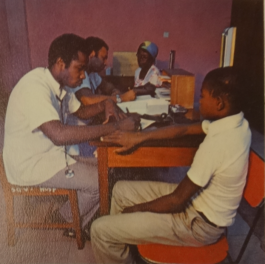
Hybrid workshop “Health and socialism: of shortages and solidarity”, October 9-10, Berlin

Berlin, Germany, October 9-10, 2023
Organizers: Dora Vargha, Luis Aue, and Alila Brossard Antonielli
Register for online participation here: https://www.eventbrite.com/e/workshop-health-and-socialism-of-shortages-and-solidarity-tickets-719623482207
The research project “Socialist Medicine: an Alternative Global Health History”, funded by the ERC Starting Grant SOCMED, invites us to rethink the emergence of global health in the 20th century. The project aims to broaden the scope of global health history by redirecting the focus of research in terms of place, people, and institutions to the socialist world: political ideology, expert networks, economic development, aid, and military interventions connected a fluctuating constellation of socialist countries in Eastern Europe, Asia, Latin America and Africa.
The workshop takes as a starting point the exploration of existing and perceived material and financial shortages and shortcomings in technological and scientific expertise. It examines how these challenges were addressed through concepts of aid, solidarity, collaboration and exchange in shaping global health structures. Held at Harnack-Haus in Berlin, the workshop invites historians and social scientists to present works that investigate local and global experiences touching these themes.
The West perceived the socialist world through tropes of shortage: of basic necessities, consumer products, and provisions for health. Shortage became a cornerstone of Cold War rhetoric, contrasted with the abundance of the West’s market economy and healthcare. Shortages were, of course, a reality that permeated everyday life, scientific research and medical practice in state socialist countries, sometimes paired with planned or accidental abundance in expertise and medical goods. Local and regional shortages often nested in global scarcity of new vaccines or antibiotics, in which the interests of East and West aligned and clashed. Decolonising states with their contested status in the international health system, and facing grave material, administrative and personnel shortages, became promising targets of aid from both sides.
Socialist countries, themselves recipients of international aid and perceived as in need of development, created a parallel network of aid for the expression of socialist solidarity and material gain through direct interventions into “Third World” countries, and through interactions with the Non-Aligned movement.
Program
Monday, 09.10.2023
8:30 Welcome and introduction
9:00 - 10:30 - Liberation movements and socialist medical solidarity
Discussant: Luis Aue (Humboldt-Universität zu Berlin)
Arianna Pasqualini (Università degli Studi di Bologna): From Cassinga to East Berlin: Namibians under socialist care
Jelena Đureinović (University of Vienna): Partisans, Prosthetics and Decolonisation: The Flow of Medical Aid from Yugoslavia to Liberation Movements in Africa
Jan Adamec (Independent scholar): „Young, inexperienced doctors who didn't know anything yet…“: Czechoslovak medical team in the Korean War (1952 – 1953) between professionalism, internationalism and orientalism
10:30 - 11:00 - Coffee break
11:00 - 12:30 - Eastern European experts and health internationalism
Discussant: Maria Pirogovskaya (Max Planck Institute for the History of Science)
Eva Rogaar (University of Amsterdam): Developing Family Health in Central Asia and Beyond: Uzbek Experts, Transnational Networks, and Medical Knowledge during the Cold War
Dora Vargha (Humboldt-Universität zu Berlin/University of Exeter/MPIWG): Formalising socialist international health: from aid to diplomacy
Roderick Bailey (University of Oxford): Cold wars and cadavers: Western perceptions of a Soviet solution to blood shortages
12:30 - 14:00 - Lunch Break
14:00 - 15:30 Professionalized Socialist Internationalism
Discussant: Pascal Grosse (Charité)
John Nott and Marlee Tichenor (University of Edinburgh): Epidemiology and African socialism
Luis Aue (Humboldt-Universität zu Berlin): Forging Tropical Medicine in the GDR:
Medical Internationalism between International Solidarity, Medical Whiteness, and Shortages
Severyan Dyakonov (New York University): The Soviet Red Cross in the International Red Cross Movement during the Cold War.
15:30 - 16:00 - Coffee break
16:00 - 17:30 Keynote
Bogdan Iacob (“Nicolae Iorga” Institute of History in Bucharest-Romanian Academy): Socialist Medicine Travels: The Challenge of Postcolonial Spaces
Tuesday 10.10.2023
09:00 - 10:30 - Socialist Ideas and health
Discussant: Dora Vargha (Humboldt-Universität zu Berlin/University of Exeter/MPIWG)
Frédéric Keck (CNRS/LAS): French socialism, « primitive mentality » and preparedness : a genealogy of the Lévy-Bruhl family
Nicole Albrecht (Birbeck, University of London): Dr Andrija Štampar: The Significance of Peasant Internationalism for Understanding Socialist Medicine and Solidarity
Gabriela Alves Miranda (COC/FIOCRUZ): The Journal Atualidades Médicas e Biológicas and Soviet Medicine - To make the "few" become the "many" (Brazil, 1951-1960).
10:30 - 11:00 Coffee break
11:00 - 12:30 - Pharmaceutical production: innovation between shortages and solidarity
Discussant: Alila Brossard Antonielli (Humboldt-Universität zu Berlin/Cermes3)
Piotr Skalski (Poznan University of Medical Sciences): Foreign cooperation of the pharmaceutical industry in the Polish People's Republic: a case study
Gabrielle Robbins (Johns Hopkins University): “May Madagascar Live Long and Never Kneel”: Building and Remembering Autonomous Medical Industries to “Live Long” in Madagascar’s Democratic Republic (1975-1992)
Luiz Villarinho (ENSP/Fiocruz): Antibiotics in the fight against tuberculosis in Brazil before the 1990s: social medicine and pharmaceuticalization
12:30 - 14:00 Lunch Break
14:00 - 15:30 Practices and politics of medical solidarity
Discussant: Álvaro Morcillo Laiz (Freie Universität)
Andrea Azizi Kifyasi (University of Dar es Salaam): China, a Friend in Need." Disentangling the Contexts for China's Medical Assistance in Tanzania, 1961-1971
Alila Brossard Antonielli (Humboldt-Universität zu Berlin/Cermes3): Medical cooperantes in Mozambique, adapting and contributing to a new socialist health system 1975-1984
Gourav Krishna Nandi (Independent scholar): Reframing Rajkumari Amrit Kaur: Worldmaking through postcolonial health diplomacy in the 1950s
15:30 - 16:30 Coffee break and concluding remarks/discussion
